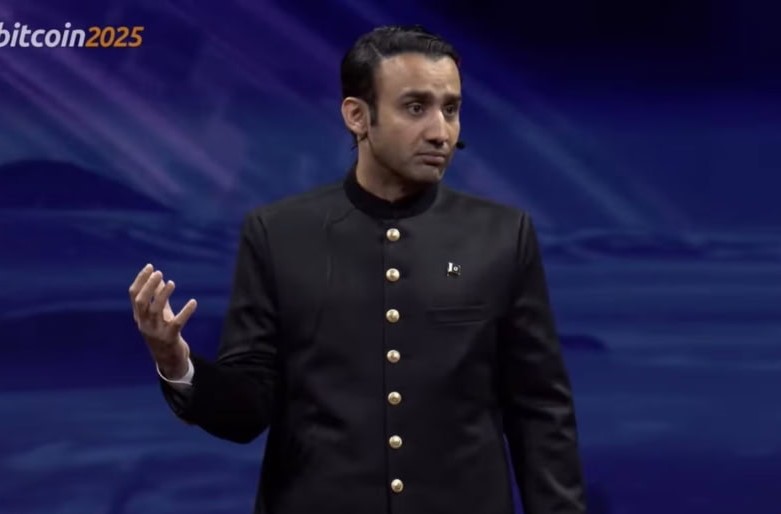By Staff Reporter
ISLAMABAD: Minister for Crypto and Blockchain, Bilal Bin Saqib, unveiled the country’s first government-led strategic bitcoin reserve at Bitcoin Vegas 2025, signaling the country’s entry into the global digital finance landscape
The reserve is funded by bitcoin forfeited by the US Treasury, a move tied to President Donald Trump’s March 2025 decision to redirect seized cryptocurrency holdings.
Saqib revealed the plan in a keynote address at the largest bitcoin conference in the United States, underscoring Pakistan’s ambition to harness decentralised finance and leverage its youthful, tech-savvy population to drive economic innovation.
“Bilal announced the establishment of a national Bitcoin wallet, holding digital assets already in state custody — not for sale or speculation, but as a sovereign reserve signaling long-term belief in decentralized finance,” his office said in a statement.
Saqib spoke to an elite audience including US Vice President JD Vance, Eric Trump, and Donald Trump Jr.
“Pakistan is no longer defined by its past. It is being reborn as a forward-looking hub of digital innovation — powered by its youth, sharpened by necessity, and led by a new generation of tech statesmen,” Saqib said in a statement.
“I’m not just here as a minister; I’m here as the voice of a generation — a generation that is online, on-chain, and unstoppable.”
Pakistan’s strategic bitcoin reserve is the latest in a series of moves to establish the country as a leader in the cryptocurrency and blockchain space. In March, the government set up the PCC, with Saqib, 34, as CEO, tasked with creating a legal framework for cryptocurrency trading to attract international investment.
Last month, Pakistan rolled out its first-ever policy framework for digital money, crafted by a special government group under the Anti-Money Laundering (AML) and Counter Terrorism Financing (CTF) authority. The framework aligns with the Financial Action Task Force (FATF) guidelines.
Earlier this month, the government approved the creation of the Pakistan Digital Assets Authority (PDAA), a regulatory body to oversee blockchain-based financial infrastructure. Saqib is spearheading the PDAA’s development, aiming to “empower builders, protect investors, and formalize digital finance frameworks for the future,” according to his office.
During his keynote, Saqib spotlighted Pakistan’s strengths: over 40 million crypto wallets, a median age of 23, and one of the world’s largest and most active freelancer economies.
“If you’re building something real — come build it in Pakistan. Come build wallets for the unbanked. Come tokenise land. Come scale your mission with our youth and our unstoppable grit,” he said. “Both Pakistan and bitcoin have suffered from bad PR. But if you look past the headlines, you’ll see something else: talent, resilience, and vision.”
Regulatory Challenges
Despite the government’s ambitious vision, Pakistan faces significant hurdles. Finance Secretary Imdadullah Bosal said a cryptocurrency ban remains in effect, with regulators still debating a legal path forward. The central bank does not recognize crypto assets and issued a notice in 2022 advising the public to refrain from trading them.
At a meeting of the National Assembly Standing Committee on Finance on Thursday, Pakistan People’s Party lawmaker Sharmila Farooqi introduced a bill on digital currency regulations, raising concerns about decentralization and financial crime.
“There are no regulations for cryptocurrency,” she said. “How will Pakistan protect cryptocurrency from money laundering?” Farooqi pointed to Pakistan’s exit from the FATF’s ‘grey list’ in 2022, after years of scrutiny over terror financing and money laundering, as a reason for caution.
The central bank official Sohail Jawad noted that only El Salvador has legalized cryptocurrency globally, and even they are now reversing course. “The National Working Group on Digital Currency has been established, while suggestions have been given to the Crypto Council,” he said.
Pakistan is betting on its young, tech-savvy population and surplus resources to fuel blockchain push. It has earmarked 2,000 megawatts of excess electricity for bitcoin mining and AI data centers, aiming to draw global tech and clean energy firms.
The initiative aligns with Trump’s pro-crypto stance. Since pledging to be a “crypto president,” he has hosted industry leaders at the White House and launched a cryptocurrency working group.
Copyright © 2021 Independent Pakistan | All rights reserved




